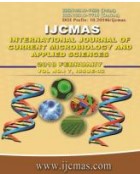


 National Academy of Agricultural Sciences (NAAS)
National Academy of Agricultural Sciences (NAAS)

|
PRINT ISSN : 2319-7692
Online ISSN : 2319-7706 Issues : 12 per year Publisher : Excellent Publishers Email : editorijcmas@gmail.com / submit@ijcmas.com Editor-in-chief: Dr.M.Prakash Index Copernicus ICV 2018: 95.39 NAAS RATING 2020: 5.38 |
India has been able to produce enough to feed its 1.25 + billion As well as export food grains to other countries. But the challenge to feed a Projected population of1.6 billion in 2050 and provide them with nutrition Security, is a formidable one because of the continuously degrading natural resource base and shrinking of good agriculture land for cultivation, It has been estimated that to meet the demands of that vast population, land productivity has to be enhanced four times along with three fold increase is water productivity and concomitant increase of six times in labour productivity. The era of Anthropocene has been endorsed by both climatic and non–climatic factors. It may increase the risk of food and water security across the globe. Among all, carbon (C) sequestration is one of the important strategies that could mitigate the effect of climate change to some extent by transferring atmospheric CO2–C into the long- live natural pools such as soils and perennial green biomass. Soil organic carbon (SOC) has relation in plant growth and agronomic productivity Most of the soils of India have been depleted their SOC stocks. Further, changes in climate are exacerbating the risk of soil erosion and alter nutrient cycling, and thereby impacting optimization of crop production. Therefore, conservation of sol organic matter (SOM) is essential to prevent soils from further degradation and for overall soil health maintenance. This article focuses climate change impact on agriculture, C Sequestration and their role on vice-VERSA. The strategies for C sink (efficient use of crop residue, conservation agriculture, integrated nutrient management, agroforestry, cover crop, use of organic and other bio-solids etc.) along with soil C which will have marked influence on sustainable crop production and impart climate resilience.
 |
 |
 |
 |
 |